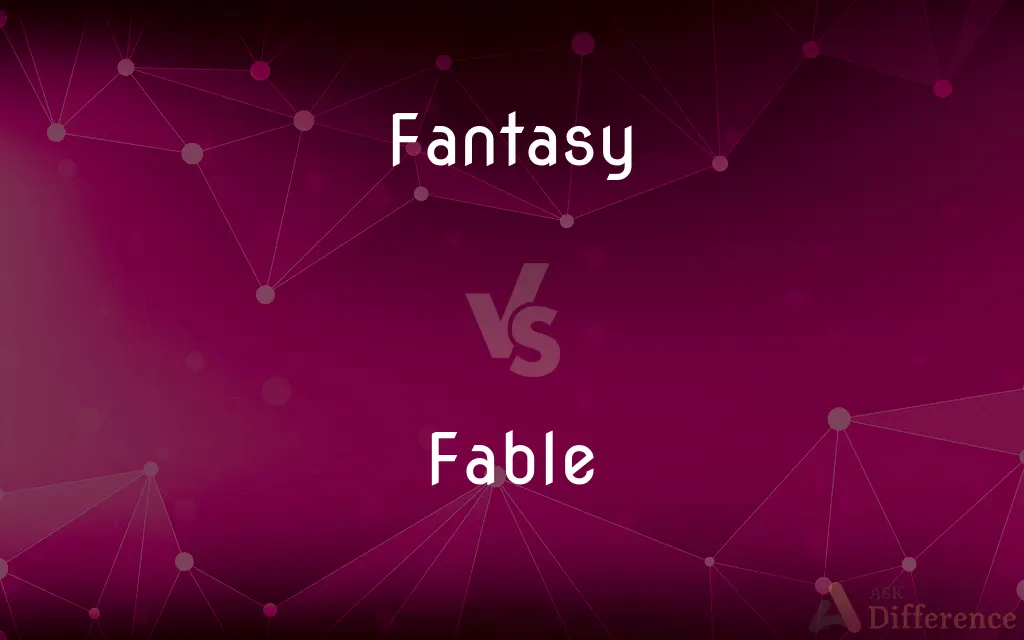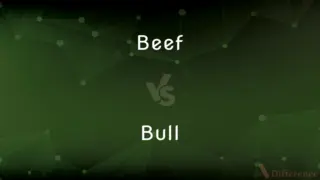Fantasy vs. Fable — What's the Difference?
Edited by Tayyaba Rehman — By Fiza Rafique — Updated on March 28, 2024
Fantasy is a genre of speculative fiction involving magical or supernatural elements, while a fable is a short story, often with animals as characters, that teaches a moral lesson.

Difference Between Fantasy and Fable
Table of Contents
ADVERTISEMENT
Key Differences
Fantasy literature creates worlds where magical powers, mythical beings, and fantastical adventures are central to the plot and character development. These narratives often explore complex themes through the lens of the supernatural. On the other hand, fables are concise tales that use simple language and anthropomorphized animals to convey ethical or moral teachings. The purpose of a fable is primarily didactic, aiming to impart wisdom or life lessons to its audience.
While fantasy stories can span entire book series with elaborate world-building and complex plots, fables are characterized by their brevity and straightforward message. Fantasy often targets a broad audience, ranging from children to adults, and engages readers with its imaginative depth and creativity. Conversely, fables, although enjoyed by readers of all ages, are particularly tailored towards children and those seeking clear, instructive narratives.
Fantasy genres can vary widely, encompassing high fantasy with its own unique worlds and rules, to urban fantasy set in a recognizably real world with magical elements. Fables, however, maintain a consistent structure and style, focusing on delivering a moral through the actions and consequences faced by its characters, usually without much deviation.
The characters in fantasy narratives are often deeply developed, with complex personalities and backgrounds that contribute to the story's progression. In contrast, characters in fables are typically one-dimensional, embodying specific virtues or vices intended to illustrate the tale’s moral.
Fantasy's primary aim is to entertain and immerse the reader in an alternate reality, often leaving them with thematic insights about real-world issues. Fables, while also entertaining, serve a more straightforward educational purpose, using their narratives to directly communicate ethical guidelines.
ADVERTISEMENT
Comparison Chart
Purpose
Entertainment and exploration of themes through magical elements
Teaching moral lessons using simple, instructive stories
Narrative Depth
Complex plots and detailed world-building
Short, straightforward narratives with a clear message
Characters
Often complex with detailed backgrounds
One-dimensional, representing virtues or vices
Audience
Broad, from children to adults
All ages, but particularly tailored towards children
Examples
"The Lord of the Rings" by J.R.R. Tolkien, "Harry Potter" series by J.K. Rowling
"The Tortoise and the Hare," "The Ant and the Grasshopper"
Compare with Definitions
Fantasy
A genre involving magical or supernatural elements.
The Chronicles of Narnia feature talking animals and magical adventures.
Fable
A short story with a moral lesson.
The Boy Who Cried Wolf teaches the importance of honesty.
Fantasy
Can include various sub-genres.
Urban fantasy blends real-world settings with magical elements.
Fable
Often features animals as characters.
In The Lion and the Mouse, animals demonstrate kindness and gratitude.
Fantasy
Focuses on world-building.
Game of Thrones creates a vast and detailed fantasy world.
Fable
Simple and direct narrative.
Fables use straightforward storytelling to deliver their message.
Fantasy
Engages readers' imagination.
Fantasy literature invites readers into imaginative, unexplored worlds.
Fable
Tailored towards children.
Fables are often included in children's literature for moral education.
Fantasy
Explores complex themes.
Fantasy novels often tackle themes of good vs. evil.
Fable
Aimed at imparting wisdom.
Fables are used as educational tools to convey ethical teachings.
Fantasy
Fantasy is a genre of speculative fiction set in a fictional universe, often inspired by real world myth and folklore. Its roots are in oral traditions, which then became fantasy literature and drama.
Fable
Fable is a literary genre: a succinct fictional story, in prose or verse, that features animals, legendary creatures, plants, inanimate objects, or forces of nature that are anthropomorphized, and that illustrates or leads to a particular moral lesson (a "moral"), which may at the end be added explicitly as a concise maxim or saying. A fable differs from a parable in that the latter excludes animals, plants, inanimate objects, and forces of nature as actors that assume speech or other powers of humankind.
Fantasy
The faculty or activity of imagining impossible or improbable things
His researches had moved into the realms of fantasy
A fantasy world
Fable
A usually short narrative making an edifying or cautionary point and often employing as characters animals that speak and act like humans.
Fantasy
A fantasia.
Fable
A story about legendary persons and exploits.
Fantasy
Imagine the occurrence of; fantasize about
It is ludicrous to fantasy ‘disinventing’ the hydrogen bomb
Fable
A falsehood; a lie.
Fantasy
The creative imagination; unrestrained fancy.
Fable
To recount as if true.
Fantasy
Something, such as an invention, that is a creation of the fancy.
Fable
To compose fables.
Fantasy
A capricious or fantastic idea; a conceit.
Fable
A fictitious narrative intended to enforce some useful truth or precept, usually with animals, etc. as characters; an apologue. Prototypically, Aesop's Fables.
Fantasy
A genre of fiction or other artistic work characterized by fanciful or supernatural elements.
Fable
Any story told to excite wonder; common talk; the theme of talk.
Fantasy
A work of this genre.
Fable
Fiction; untruth; falsehood.
Fantasy
An imagined event or sequence of mental images, such as a daydream, usually fulfilling a wish or psychological need.
Fable
The plot, story, or connected series of events forming the subject of an epic or dramatic poem.
Fantasy
An unrealistic or improbable supposition.
Fable
To compose fables; hence, to write or speak fiction; to write or utter what is not true.
Fantasy
(Music) See fantasia.
Fable
To make up; to devise, and speak of, as true or real; to tell of falsely; to recount in the form of a fable.
Fantasy
A coin issued especially by a questionable authority and not intended for use as currency.
Fable
A Feigned story or tale, intended to instruct or amuse; a fictitious narration intended to enforce some useful truth or precept; an apologue. See the Note under Apologue.
Jotham's fable of the trees is the oldest extant.
Fantasy
(Obsolete) A hallucination.
Fable
The plot, story, or connected series of events, forming the subject of an epic or dramatic poem.
The moral is the first business of the poet; this being formed, he contrives such a design or fable as may be most suitable to the moral.
Fantasy
Relating to or being a game in which participants act as owners of imaginary sports teams whose personnel consists of actual players selected from a professional sports league and team performance is determined by the combined statistics of the players.
Fable
Any story told to excite wonder; common talk; the theme of talk.
We grewThe fable of the city where we dwelt.
Fantasy
To imagine; visualize.
Fable
Fiction; untruth; falsehood.
It would look like a fable to report that this gentleman gives away a great fortune by secret methods.
Fantasy
That which comes from one's imagination.
Fable
To compose fables; hence, to write or speak fiction ; to write or utter what is not true.
Vain now the tales which fabling poets tell.
He fables, yet speaks truth.
Fantasy
(literature) The literary genre generally dealing with themes of magic and the supernatural, imaginary worlds and creatures, etc.
Fable
To feign; to invent; to devise, and speak of, as true or real; to tell of falsely.
The hell thou fablest.
Fantasy
A fantastical design.
Fable
A deliberately false or improbable account
Fantasy
(slang) The drug gamma-hydroxybutyric acid.
Fable
A short moral story (often with animal characters)
Fantasy
To fantasize (about).
Fable
A story about mythical or supernatural beings or events
Fantasy
(obsolete) To have a fancy for; to be pleased with; to like.
Fantasy
(transitive) To imagine; to conceive mentally.
Fantasy
Fancy; imagination; especially, a whimsical or fanciful conception; a vagary of the imagination; whim; caprice; humor.
Is not this something more than fantasy ?
A thousand fantasiesBegin to throng into my memory.
Fantasy
Fantastic designs.
Embroidered with fantasies and flourishes of gold thread.
Fantasy
To have a fancy for; to be pleased with; to like; to fancy.
Which he doth most fantasy.
Fantasy
Imagination unrestricted by reality;
A schoolgirl fantasy
Fantasy
Fiction with a large amount of fantasy in it;
She made a lot of money writing romantic fantasies
Fantasy
Something many people believe that is false;
They have the illusion that I am very wealthy
Common Curiosities
Can adults enjoy fables as much as children?
Yes, while tailored towards children, fables offer timeless wisdom that can resonate with adults.
Are all fantasy stories set in completely different worlds?
Not necessarily; while many are, urban fantasy stories blend magical elements with the real world.
Do fables always feature animal characters?
While common, not all fables use animals; some use humans or inanimate objects to convey the moral.
Can a story be both a fantasy and a fable?
Yes, if it combines fantastical elements with a clear moral lesson, it can overlap both genres.
Why are fables so short?
Their brevity ensures the moral of the story is easily understood, especially by children.
How do readers benefit from fantasy?
It stimulates imagination, provides escapism, and can offer insight into real-world problems through allegorical storytelling.
What defines a fantasy story?
A narrative that includes magical or supernatural elements in a detailed, often imaginative setting.
What is the main purpose of a fable?
To teach moral or ethical lessons through simple, allegorical stories.
How do the themes in fantasy and fables differ?
Fantasy themes are diverse and can explore deep philosophical issues, whereas fables focus on basic moral and ethical lessons.
Why do fables use animals as characters?
Animals can symbolize human traits in a universal, easily recognizable way, making the moral clearer.
Are there modern fables?
Yes, authors continue to write fables, sometimes modernizing the settings or themes to appeal to contemporary audiences.
What makes a character in a fable different from one in a fantasy?
Fable characters are more symbolic, representing specific traits, while fantasy characters are usually more complex and dynamic.
Can fantasy stories teach lessons like fables do?
Yes, while not their primary purpose, many fantasy stories convey deeper messages or themes.
Is world-building important in fables?
No, fables focus on the moral lesson rather than detailed setting or world-building.
How has fantasy literature evolved over time?
It has grown to include a wide range of sub-genres and themes, reflecting broader societal changes and technological advancements.
Share Your Discovery

Previous Comparison
Canal vs. Channel
Next Comparison
Beef vs. BullAuthor Spotlight
Written by
Fiza RafiqueFiza Rafique is a skilled content writer at AskDifference.com, where she meticulously refines and enhances written pieces. Drawing from her vast editorial expertise, Fiza ensures clarity, accuracy, and precision in every article. Passionate about language, she continually seeks to elevate the quality of content for readers worldwide.
Edited by
Tayyaba RehmanTayyaba Rehman is a distinguished writer, currently serving as a primary contributor to askdifference.com. As a researcher in semantics and etymology, Tayyaba's passion for the complexity of languages and their distinctions has found a perfect home on the platform. Tayyaba delves into the intricacies of language, distinguishing between commonly confused words and phrases, thereby providing clarity for readers worldwide.















































